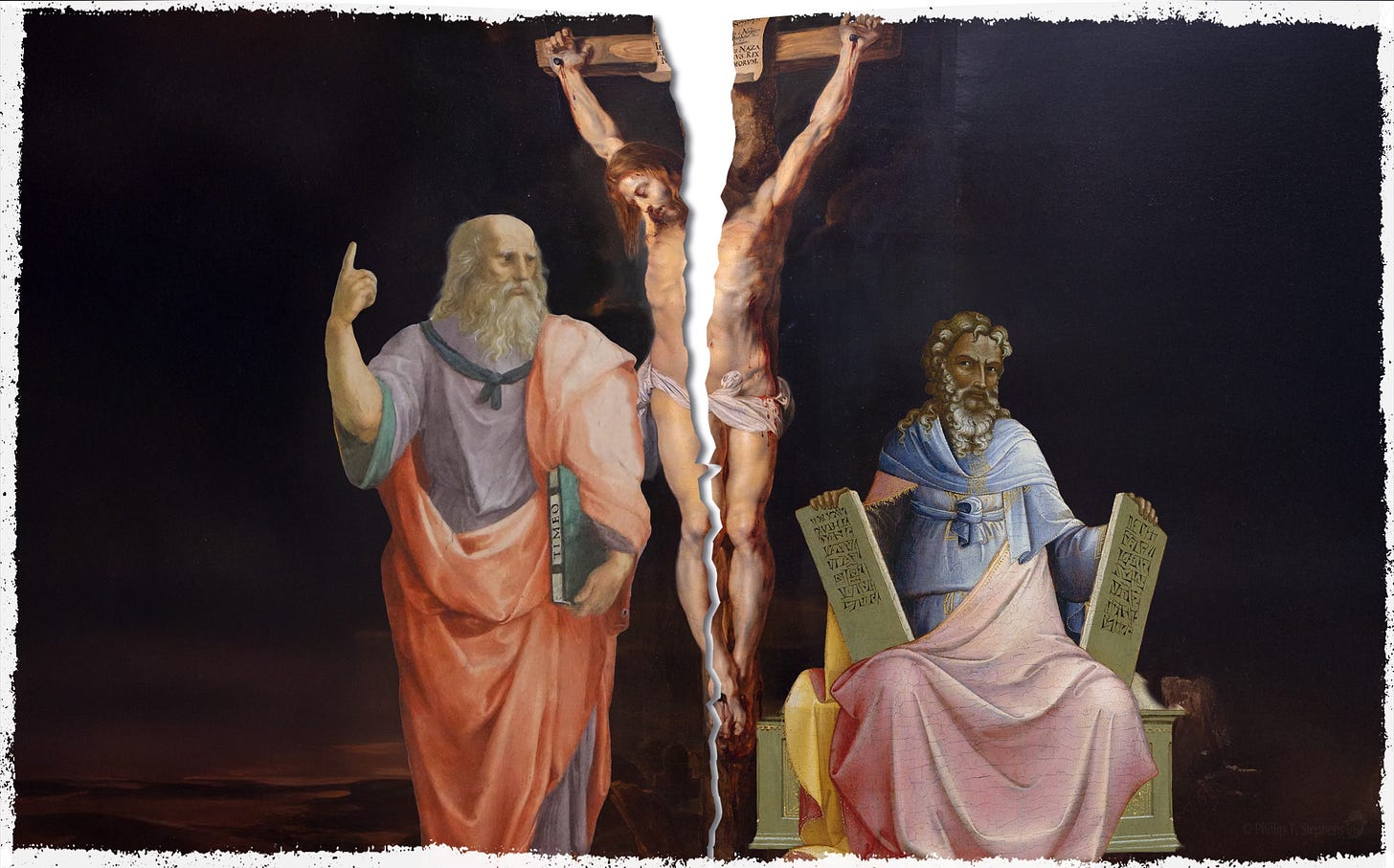A shorter version of this article was originally published in The Backyard Church on June 27, 2025.
While many Christians came name the moment that made them rethink their faith, I can’t pinpoint one. I can pinpoint one epiphany, but it had nothing to do with my faith. A statement in a class on phenomenology changed my thinking forever. During a lecturing on Plato and Heidegger, a student asked, “But Dr. Driedbach, didn’t Plato say the exact opposite in…” I forgot which dialogue. (It was fifty years ago.)
Driesbach didn’t pause. He informed the student, “Plato forgot.”
And there it was. Philosophy is fallible because humans are fallible. Which resolved issues that arose for me in my philosophy of religion class where I first leaned of Charles Hartshorne’s rebuttal to Anselm (who I discuss further down).
Put simply, statements about God are meaningless because those who make them refuse to explain what it would take to disprove them. In other words, it doesn’t matter what proof you offer, it will never be enough for us to admit we’re wrong. (A sentiment anyone who’s survived a fundamentalist/evangelical upbringing will appreciate.) Accordingly, statements about God such as, “He will cover you with his feathers, and under his wings you will find refuge,” are little more than poetry and nonsense.
That statement disturbed me. I realized the philosophical tradition equated scientific statements with poetry and metaphor. I would never argue that metaphors were scientific, but I would never deny them meaning. Soon I discovered that European philosophers agreed with me, leading me to cognitive metaphor theory, deconstruction, postmodernism, and narrative theory, only to discover, to my horror, that the Christian Right had subverted postmodern theory to create chaos and dissension and disrupt political systems and the assemblies of Jesus as well.
Once staunch advocates of absolutism, the Christian Right now aggressively pushes an anti-Jesus, anti-gospel (good news) agenda while responding to their critics with, “that’s your truth. I don’t have to listen.” All the while they make sure the rest of us listen to “their truth” by drowning out the media landscape.
Nature of human minds
For thousands of years philosophers and scholars believed we could find truth, either by experimentation or the process of reason. Christians have believed we could find truth through the teachings of the church or by reading scripture. The fact that no one ever agreed on any conclusion, ever, never clued us in that we might be wrong.
Sometime in the 20th century that changes. Scientists developed the tools to study the human brain, of which we knew very little. Philosophers such as Wittgenstein and Derrida demonstrated that language is slippery, which make the ideas we express with language more slippery.
The academic community still hasn’t (and likely never will) reached consensus, but we can pull some useful threads from their discoveries and discussions.
Once staunch advocates of absolutism, the Christian Right now aggressively pushes an anti-Jesus, anti-gospel (good news) agenda while responding to their critics with, “that’s your truth. I don’t have to listen.” All the while they make sure the rest of us listen to “their truth” by drowning out the media landscape.
Humans can’t process the information that bombards us daily. Our eyes filter visual information, our brains sift through audio cues, our body reacts to thousands of stimuli. As a result we have to pick and choose what’s meaningful. How do we choose? We look for patterns, rely on past experiences, focus on the loudest and most obvious, and slowly train our brains to process “useful date” from apparently useless, unneeded, or misleading data. That’s how we learn when it’s safe to pet a dog and when they’re about to bite. Even then we get things wrong.
What we don’t understand is that the strategies we form to process information also mislead us. Tendencies such as confirmation bias, which is a neurological process. The brain strengthens the neurons that affirms what we already believes, and discards contrary information. The stronger the neuron the more likely our brains are to notice, or accept any information that suggests differently, even if that leads us to make mistakes.
Cognitive dissonance causes our brains to stress when confronted with two conflicting values they find appealing. As a result they choose one and reject the other simply to relieve the distress.
Similarly, we fall prey to a phenomenon called apophenia, in which our desire to make patterns from unfamiliar and confusing information leads us to force connections that don’t exist in reality. Gamblers, for example, frequently bet on perceive patterns in random events, which is why so many lose money.
When we combine confirmation bias with cognitive dissonance and apophenia, and throw in all the information we don’t even notice, information we forget, items we confused or remember poorly, and the fact that everyone around us is processing information exactly the same way but finding different patterns, storing different memories, and reaching different conclusions, we have a mess.
Keep reading with a 7-day free trial
Subscribe to Phillip T. Stephens to keep reading this post and get 7 days of free access to the full post archives.



